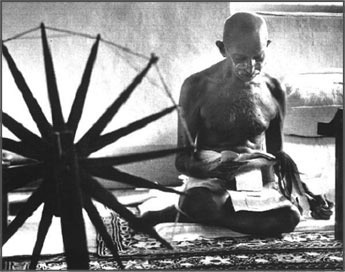“India lives in its villages”, said Gandhi. Thus his economic Philosophy and views were also village centered.
Gandhiji believed in village economic zones, co-operatives, and Traditional industry. He believed in manual labour more than machinery. He discouraged mass manufacturing. He believed that it killed labour and destroyed villages. He believed in mass involvement rather than mass production. He visualized self sufficient India, rather self sufficient villages. He discouraged organic composition of capital and unequal distribution of wealth.
There is a misconception that he was against science and technology and development. A misconception that he wanted to banish machinery and large scale industry. Another misinterpretation of his philosophy is that he wanted to take India back to its villages. Infact Gandhiji was not against these things. To quote Gandhiji himself “Machinery has its place, it has come to a stage. But it must not be allowed to dispose a necessary labour”.
Gandhiji was only worried about the Industrial mass scale expansion which acted in an antagonistic to village economy. As he stated in Harijan (weekly), August 29th 1936 that-
“Industrilisation on a mass scale, will necessary leas to passive or active exploitation of the villages as the problem of competition and marketing comes in”.
Counteracting forces may also arise to influence the actual outcome. As soon as men become conscious of some tendency of which they do not approve, a counteracting force may be set up as a matter of deliberate policy.
Tendency to substitute machinery for labour is called organic composition of capital and Gandhiji was strictly against it. He believed that it causes exploitation of villages and poor people.
Gandhiji said about private ownership- “If we discard private ownership in the means of production but persisted with cult of industrilisation, we might not get rid of harmful tendencies mentioned above”.
Gandhiji was also against mechanised work. He believed that since mechanised work sub-divides the work among labour, half being semi-automatic so the meaning of the whole work is not reflected in that minutely sub-divided work, hence there is no creative satisfaction is the work to be performed. The labour becomes dis-tasteful.
Gandhiji as a fond reader of Gita, described few economic words like labour and money from Gita. He said labour is a kind of “Yajna”- i.e. a sacrifice or an offering to humanity labour is a man’s way of forging a bond of solidarity with fellow humans. Organised labour takes man closer to nature.
Protection of villages is his first and foremost economic agenda. He says “under my scheme, nothing will be allowed to be produced by the cities which can be equally well produced in villages”.
He thought highly of chakra and considered spinning the chakra (wheel) could transform Indian economy. He said “I have not contemplated much less advised, the abandonment of a single healthy life giving industrial activity for the sake of hand spinning (Young India, 27th may 1926)”.
Gandhiji opposed the private ownership of the means of production and exploitation of man by man, for the simple reason that this was not consistent with Non-violence.
He favoured co-operation and always encourage co-operatives. He said- “As far as possible every activity will be conducted on a co-operative basis (Young India, 13th November 1924)”.
Basic necessity becomes, demand becomes desire become greed and human satisfaction is never quenches. For that Gandhiji offered one solution of Non-possession. To give up the desire of all these materials which are not indispensable. Thus it make our dependency less and independency more.
Relevance of his economic philosophy will always be there whether it is 21st century or 25th century. Today of course self sufficiently is absurd but still economic independency can be achieved. Even today millions are unemployed, and several thousands are underemployed. All these employment problems can be resolved only when we follow Gandhain economic philosophy. By being more dependent on these unemployed hands rather than automatic machines. Today we are completely dependent on oil from middle east, technology from west thus our freedom of economy is lost, it can be regained and purna-swaraj be obtained only when we try to become self sufficient and also by adopting Non-possession principle.
Sunday, September 30, 2007
Gandhiji’s Economic Philosophy. How far it is relevant today?
Posted by
Adi
at
1:41 AM
![]()
Subscribe to:
Post Comments (Atom)








No comments:
Post a Comment